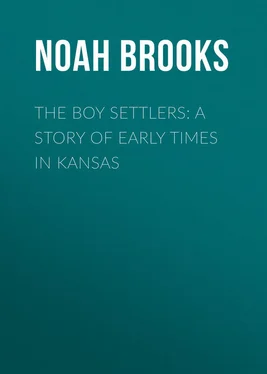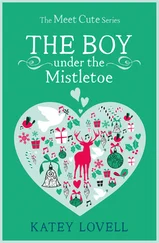Noah Brooks - The Boy Settlers - A Story of Early Times in Kansas
Здесь есть возможность читать онлайн «Noah Brooks - The Boy Settlers - A Story of Early Times in Kansas» — ознакомительный отрывок электронной книги совершенно бесплатно, а после прочтения отрывка купить полную версию. В некоторых случаях можно слушать аудио, скачать через торрент в формате fb2 и присутствует краткое содержание. Жанр: foreign_antique, foreign_prose, foreign_children, на английском языке. Описание произведения, (предисловие) а так же отзывы посетителей доступны на портале библиотеки ЛибКат.
- Название:The Boy Settlers: A Story of Early Times in Kansas
- Автор:
- Жанр:
- Год:неизвестен
- ISBN:нет данных
- Рейтинг книги:5 / 5. Голосов: 1
-
Избранное:Добавить в избранное
- Отзывы:
-
Ваша оценка:
- 100
- 1
- 2
- 3
- 4
- 5
The Boy Settlers: A Story of Early Times in Kansas: краткое содержание, описание и аннотация
Предлагаем к чтению аннотацию, описание, краткое содержание или предисловие (зависит от того, что написал сам автор книги «The Boy Settlers: A Story of Early Times in Kansas»). Если вы не нашли необходимую информацию о книге — напишите в комментариях, мы постараемся отыскать её.
The Boy Settlers: A Story of Early Times in Kansas — читать онлайн ознакомительный отрывок
Ниже представлен текст книги, разбитый по страницам. Система сохранения места последней прочитанной страницы, позволяет с удобством читать онлайн бесплатно книгу «The Boy Settlers: A Story of Early Times in Kansas», без необходимости каждый раз заново искать на чём Вы остановились. Поставьте закладку, и сможете в любой момент перейти на страницу, на которой закончили чтение.
Интервал:
Закладка:
They made sad work with their first breakfast in camp. Oscar had taken a few lessons in cooking from his mother, before leaving home, and the two men had had some experience in that line of duty when out on hunting expeditious in Illinois, years before. So they managed to make coffee, fry slices of side-meat, and bake a hoe-cake of Indian-corn meal. “Hog and hominy,” said Sandy’s father. “That’s the diet of the country, and that is what we shall come to, and we might as well take it first as last.”
“There’s worse provender than this, where there’s none,” said Mr. Bryant, cheerfully; “and before we get through we shall be hungry more than once for hog and hominy.”
It was an enlivening sight that greeted the eyes of the newcomers as they looked around upon the flat prairie that stretched along the river-side. The tents of the immigrants glistened in the rising sun. The smoke of many camp-fires arose on the summer air. Groups of men were busily making preparations for their long tramp westward, and, here and there, women and children were gathered around the white-topped wagons, taking their early breakfast or getting ready for the day’s march. Here, too, could now be seen the rough and surly-looking border men who were on the way to points along the route that were to be occupied by them before too many free-State men should come in. An election of some sort, the newcomers could not exactly make out what, was to take place in a day or two, and the Missourians whom they had seen flocking into Parkville were ready to vote as soon as they got into the Territory.
Breakfast over, the boys sauntered around through the camps, viewing the novel sights with vast amusement. It was like a militia muster at home, except that the only soldier element they saw was the band of rough-looking and rough-talking men who were bound to vote and fight for slavery. They swaggered about with big pistols girt at their hips and rifles over their shoulders, full-bearded and swarthy, each one a captain apparently, all without much organization, but very serious in their intention to vote and to fight. It really seemed as if they had reached the fighting-ground at last.
“See here, daddy,” said Oscar, as he came in from the camps when the Dixon caravan was ready to move; “see what I found in this newspaper. It is a piece of poetry, and a mighty fine piece, too”; and the boy began to read some lines beginning thus,–
“We cross the prairie as of old
The pilgrims crossed the sea,
To make the West, as they the East,
The homestead of the free!”
“Oh, well; I can’t bother about poetry, now,” said the father, hastily. “I have some prose work on hand, just about this time. I’m trying to drive these pesky cattle, and I don’t make a very good fist at it. Your Uncle Aleck has gone on ahead, and left me to manage the team; but it’s new business to me.”
“John G. Whittier is the name at the top of these verses. I’ve heard of him. He’s a regular-built poet,–lives somewhere down East.”
“I can’t help that, sonny; get on the other side of those steers, and see if you can’t gee them around. Dear, dear, they’re dreadful obstinate creatures!”
That night, however, when they were comfortably and safely camped in Quindaro, amid the live-oaks and the tall sycamores that embowered the pretty little town, Oscar again brought the newspaper to his father, and, with kindling eyes, said,–
“Read it out, daddy; read the piece. Why, it was written just for us, I do declare. It is called ‘The Kansas Emigrants.’ We are Kansas Emigrants, aren’t we?”
The father smiled kindly as he looked at the flushed face and bright eyes of his boy, and took from him the paper folded to show the verses. As he read, his eyes, too, flashed and his lip trembled.
“Listen to this!” he cried. “Listen to this! It is like a trumpet call!” And with a voice quivering with emotion, he began the poem,–
“We cross the prairie as of old
The pilgrims crossed the sea,
To make the West, as they the East,
The homestead of the free!”
“Something has got into my eyes,” said Mr. Howell, as the last stanza was read. “Great Scott! though, how that does stir a man’s blood!” And he furtively wiped the moisture from his eyes. It was time to put out the light and go to sleep, for the night now was well advanced. But Mr. Bryant, thoroughly aroused, read and re-read the lines aloud.
“Sing ’em,” said his brother-in-law, jokingly. Bryant was a good singer, and he at once tuned up with a fine baritone voice, recalling a familiar tune that fitted the measure of the poem.
“Oh, come now, Uncle Charlie,” cried Sandy, from his blankets in the corner of the tent, “that’s ‘Old Dundee.’ Can’t you give us something lively? Something not quite so solemn?”
“Not so solemn, my laddie? Don’t you know that this is a solemn age we are in, and a very solemn business we are on? You’ll think so before we get out of this Territory, or I am greatly mistaken.”
“Sandy’ll think it’s solemn, when he has to trot over a piece of newly broken prairie, carrying a pouchful of seed corn, dropping five grains in each sod,” said his father, laughing, as he blew out the candle.
“It’s a good song; a bully good song,” murmured the boy, turning over to sleep. “But it ought to be sung to something with more of a rig-a-jig-jig to it.” So saying, he was off to the land of dreams.
CHAPTER IV.
AMONG THE DELAWARES
Quindaro was a straggling but pretty little town built among the groves of the west bank of the Missouri. Here the emigrants found a store or trading-post, well supplied with the goods they needed, staple articles of food and the heavier farming-tools being the first required. The boys looked curiously at the big breaking-plough that was to be of so much consequence to them in their new life and labors. The prairies around their Illinois home had been long broken up when they were old enough to take notice of such things; and as they were town boys, they had never had their attention called to the implements of a prairie farm.
“It looks like a plough that has been sat down on and flattened out,” was Oscar’s remark, after they had looked the thing over very critically. It had a long and massive beam, or body, and big, strong handles, suggestive of hard work to be done with it. “The nose,” as Sandy called the point of the share, was long, flat, and as sharp as a knife. It was this thin and knife-like point that was to cut into the virgin turf of the prairie, and, as the sod was cut, the share was to turn it over, bottom side up, while the great, heavy implement was drawn along by the oxen.
“But the sod is so thick and tough,” said Oscar, “I don’t see how the oxen can drag the thing through. Will our three yoke of cattle do it?”
The two men looked at each other and smiled. This had been a subject of much anxious thought with them. They had been told that they would have difficulty in breaking up the prairie with three yoke of oxen; they should have four yoke, certainly. So when Mr. Howell explained that they must get another yoke and then rely on their being able to “change work” with some of their neighbors who might have cattle, the boys laughed outright.
“Neighbors!” cried Sandy. “Why, I didn’t suppose we should have any neighbors within five or ten miles. Did you, Oscar? I was in hopes we wouldn’t have neighbors to plague us with their pigs and chickens, and their running in to borrow a cupful of molasses, or last week’s newspaper. Neighbors!” and the boy’s brown face wore an expression of disgust.
“Don’t you worry about neighbors, Sandy,” said his uncle. “Even if we have any within five miles of us, we shall do well. But if there is to be any fighting, we shall want neighbors to join forces with us, and we shall find them handy, anyhow, in case of sickness or trouble. We cannot get along in a new country like this without neighbors, and you bear that in mind, Master Sandy.”
Читать дальшеИнтервал:
Закладка:
Похожие книги на «The Boy Settlers: A Story of Early Times in Kansas»
Представляем Вашему вниманию похожие книги на «The Boy Settlers: A Story of Early Times in Kansas» списком для выбора. Мы отобрали схожую по названию и смыслу литературу в надежде предоставить читателям больше вариантов отыскать новые, интересные, ещё непрочитанные произведения.
Обсуждение, отзывы о книге «The Boy Settlers: A Story of Early Times in Kansas» и просто собственные мнения читателей. Оставьте ваши комментарии, напишите, что Вы думаете о произведении, его смысле или главных героях. Укажите что конкретно понравилось, а что нет, и почему Вы так считаете.












